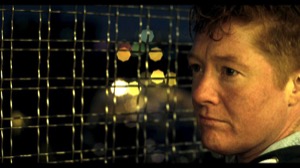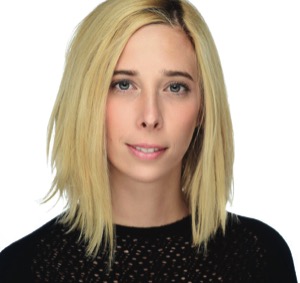
LGBT Weekly talks to director Elizabeth Rohrbaugh about her latest film exploration of the transgender community
For just under ten minutes, Dylan starts from the Coney Island Stillwell Avenue station and then walks to the shores of Coney Island before disrobing then plunging himself into the Atlantic waters, flopping around happily in his new skin. This journey, both his and ours, is one of the most recent efforts from Emmy Award-winning director Elizabeth Rohrbaugh entitled Dylan, a documentary-ish filmic experience that employs familiar and innovative documentary filmmaking techniques while using an actor to tell its story.
Based on an interview with childhood friend, Dylan Winn Garner, this poignant piece takes the viewer through the personal journey of a transgender man. It looks at his exploration into the transgender community, his family’s acceptance of his new identity and ultimately his physical and emotional transformation. In less than nine minutes the film shows how Dylan literally shed the layers that had been weighing him down for so many years and how he found freedom in self-love and acceptance.
Dylan also manages, in such a compressed schedule, to allow actress Becca Blackwell to perfectly encapsulate everything that is right about road pictures; in this case, an internal one. Dylan, which has been selected as an official entry in multiple LGBTQ film festivals both here and abroad – Boston, Melbourne, St. Louis to name but a few – is and is not a documentary but told in a way that more closely resembles The Thin Blue Line rather than Fahrenheit 451; it employs an actor to enhance rather than confuse the story and, as everyone seems to agree, allows Blackwell to shake the screen with a performance that is nothing short of rhapsodic.
Rohrbaugh began the process of making this film nearly ten years ago when she wrote the script as part of a theater writing workshop taught by Jessica Blank and Erik Jensen, who were best known for creating The Exonerated.
LGBT Weekly had the good fortune to talk with Rohrbaugh between projects to discover her thoughts on the film and what she hopes it will accomplish within the transgender community.
San Diego LGBT Weekly: When people you meet ask what you do, how do you answer them?
Elizabeth Rohrbaugh: Ha, that is a very good question. I suppose it depends on how I am feeling about myself or my career at the time. Lately I say that I am a filmmaker, whose very format is documentary, narrative or experimental.
Was there something – or someone – in particular that awoke your interest in revisiting this project after a 10-year pause?
This script never really left the back of my mind and was always something that I wanted to come back to. I spent many years making my first feature documentary, The Perfect Victim, and wanted my next project to have a different format. It took many years for me to have the confidence to pursue this type of project – simply for the sake of getting my vision out of me and into the world. I could see this film play out in my mind and feel the impact it could have and I had reached a place professionally where focusing on that seemed possible.

Do you consider Dylan a political documentary? How, if so?
I am not sure that I would necessarily consider Dylan a documentary, but I hope that it could have influence in the public’s understanding of the trans community. Although Dylan is a true story, an incredible actor named Becca Blackwell is playing the role, and the film was shot with a narrative edge in mind. I hope that when people see it, the authentic nature of the script and performance will help an audience see the human experience of being transgender and be able to incorporate that understanding into their political beliefs.
How much of a role did Dylan play in the making of his story, filmically speaking? Did he want a role in the creative process? Was he, for example, involved in who would play him?
Dylan did not have a great deal of involvement in the filmmaking process beyond the script itself. When I decided to revisit this we had lunch as I of course wanted his permission to move forward and he was excited about the idea. The only involvement beyond that was a discussion of the use of the word “tranny” in the script. Becca had some concerns about offending people with that word and the film not making the same impact as a result. I spoke with Dylan about it, and he felt strongly that this is the word he would use in this context and that there is not another casual word to use in place of it. So we decided to leave it in. Beyond that I gave him updates along the way and then the first time he saw the film was at the premiere.
How thrilled were you to be an official entrant in multiple LGBTQ film festivals, both here and abroad?
It has been amazing and wonderful to screen at various film festivals, both in the U.S. and abroad. As a filmmaker you never know what sort of life your film will have after completion, and for me the more people can see it, the greater impact it can have. For me to make a film that can be embraced by the LGBT community is a dream.
Explain to our readers, if you would, how you came to make Dylan through the narrative documentary form? Had there been a particular documentary or documentaries that have had an influence on you to make you want to explore Dylan’s story in this way?
Honestly I don’t think there are any traditional documentaries that influenced me when making this film. I have been interested for a very long time in finding a way to bring together truthful storytelling with artistry, and finding a new format to tell a story. Probably my biggest influences in that arena are Louie and Curb Your Enthusiasm. I was also very impacted by The Jinx, although it came out after I finished Dylan. I began my directing career as a director for MTV in their promos department. That experience taught me to look for new and interesting formats, film styles and ways to tell a story in a very short time frame. Dylan was very unique though in that I had such a long time between writing and filming that I could visualize the entire film before we even began shooting.
How many people did you see for the title role? What did their auditions consist of?
Becca Blackwell was my only “audition” for the role and I would not even consider it a traditional audition. My dear friends at Capes Coaching connected me with Michael Cyril Creighton who I was initially thinking of for the role. He then recommended Becca, who had been on his show Jack In A Box. I spoke with Becca initially on the phone and immediately liked her. Becca and Dylan are both from the Midwest and there was a familiarity with linguistics, pacing and attitude that felt familiar to me. I watched some videos of Becca on YouTube and was blown away. We met and discussed the role further and I knew from their similar life experiences and Becca’s incredible acting chops that I had found my “Dylan.”

Outside of your own, very personal, relationship with Dylan, how active have you been in the LGBTQ community? In what ways?
Oh goodness! I hope that my work can make an impact in the LGBT community. I recently directed and produced a music video for a wonderful singer/songwriter Alyssa Robbins called Chasing Summer, which premiered on AfterEllen a few weeks ago. I am hoping to do some screenings of Dylan at youth LGBT shelters nationwide. I have been working with the promos team at LOGO this past year, which has been wonderful.
Many trans youth face seemingly insurmountable odds growing up, facing discrimination not only from the broader public but within the LGBTQ community. What words of encouragement can you offer them?
I think and hope that the tides are beginning to turn when it comes to the public’s perception and understanding of what it means to be transgender. Progress is looming in the near future but it is not here yet. I would love to say to trans youth that being your truest self is the best thing you will ever do. There are communities of people who will support you and guidance you can seek but you are not alone in this. Understanding and acknowledging your identity is a major achievement and one that you should be proud of. And all of the hard work that you go through to live that life will be worth it in the end.











